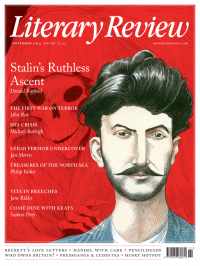Justin Beplate
‘Hammer hammer adamantine words’
The Letters of Samuel Beckett, Volume III: 1957–1965
By George Craig, Martha Dow Fehsenfeld, Dan Gunn and Lois More Overbeck (edd)
Cambridge University Press 771pp £30
The second volume of Samuel Beckett’s Letters charted his emergence as a major French-language writer in the postwar era and the financial rewards that came with successful productions of Godot both in Europe and across the Atlantic. Volume III, covering the years 1957 to 1965, sees a tentative return to English – or a queer form of it – in the composition of such works as All That Fall, a radio play written at the invitation of the BBC, and his one-act play Krapp’s Last Tape (described in a letter to Donald McWhinnie as ‘a sentimental affair in my best original English manner’). Beckett’s range of correspondents grows wider in this volume, in step with his increasingly public profile; yet, if the selection of letters gathered here is representative, the focus in this period shifts decisively towards the Anglophone world.
An assiduous correspondent by nature, Beckett struggles to balance the demands on his time created by a growing mountain of letters with the imperative to write, however arduous the work and unsatisfactory the result. One measure of the shift in Beckett’s circumstances is offered by the editors’ estimate that only

Sign Up to our newsletter
Receive free articles, highlights from the archive, news, details of prizes, and much more.@Lit_Review
Follow Literary Review on Twitter
Twitter Feed
Under its longest-serving editor, Graydon Carter, Vanity Fair was that rare thing – a New York society magazine that published serious journalism.
@PeterPeteryork looks at what Carter got right.
Peter York - Deluxe Editions
Peter York: Deluxe Editions - When the Going Was Good: An Editor’s Adventures During the Last Golden Age of Magazines by Graydon Carter
literaryreview.co.uk
Henry James returned to America in 1904 with three objectives: to see his brother William, to deliver a series of lectures on Balzac, and to gather material for a pair of books about modern America.
Peter Rose follows James out west.
Peter Rose - The Restless Analyst
Peter Rose: The Restless Analyst - Henry James Comes Home: Rediscovering America in the Gilded Age by Peter Brooks...
literaryreview.co.uk
Vladimir Putin served his apprenticeship in the KGB toward the end of the Cold War, a period during which Western societies were infiltrated by so-called 'illegals'.
Piers Brendon examines how the culture of Soviet spycraft shaped his thinking.
Piers Brendon - Tinker, Tailor, Sleeper, Troll
Piers Brendon: Tinker, Tailor, Sleeper, Troll - The Illegals: Russia’s Most Audacious Spies and the Plot to Infiltrate the West by Shaun Walker
literaryreview.co.uk